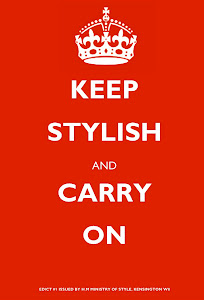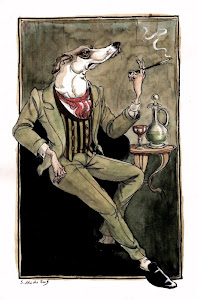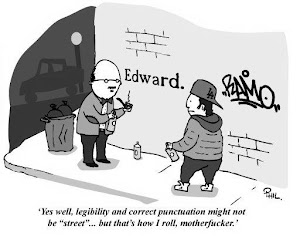
31 March 2011
30 March 2011
29 March 2011
28 March 2011
Young Fogey Pro Infinitio
One drawback to the sacred duties of successful stockbroker, electronic newspaper columnist, and cocktail-tester is that one is left with little time in which to keep up with regular key updates from alternative media. It is with some joy therefore that I post excerpts (below) from a relevant piece on the Young Fogey in today's Daily Telegraph newspaper. In it, a young writer with the curious foreign-sounding name of "Harry Mount" (most certainly a pseudonym) seeks to welcome back the Young Fogey, after having rather smugly dismissed him several years ago in the blessed pages of The Spectator.
Our Harry attributes the return of the Young Fogey to the Royal Wedding. Total nonsense. More likely certain hacks desperate for byline have decided to resurrect the type in order to take advantage of the current media cycle. Because in truth the Young Fogey never left us. Instead he settled within the field of politics, the City, field sports, and academia, where he happily remains today. He marches in the ranks of the Countryside Alliance, UKIP, and the Traditional Britain Group. Young Fogeys visit London establishments such as the New Sheridan Club "to meet, to quaff ale, chat about this and that, admire each other's tweed suits and listen to wind-up gramophones." You might even spot him at Steampunk parties. Journalistic projects such as The Chap and select electronic newspaper columns have kept the flame burning through the long night of the last decade-and-a-half, providing a home for Young Fogey dissidents and betweeded non-conformists alike. This past September the American political journal Foreign Policy published for the clueless and uninformed an analytical piece on Young Fogeys. Well-fingered copies of The Young Fogey Handbook are flying off the shelves of rare book dealers from here to Chipping Norton. As the world painfully returns to archaic, human, eternal values, the triumphant hour of the Young Fogey approaches. The Young Fogey isn't back; he never left in the first place!
Read for yourself:
The Royal Wedding effect kicks in–the Young Fogey is back!
by Harry Mount, Daily Telegraph, 28 March 2011
A combination of the Royal Wedding and a Coalition run by public schoolboys has had an interesting side-effect – the return of the Young Fogeys, those young men who wear four-piece tweed suits, read the old Prayer Book and travel around by sit-up-and-beg bicycle, equipped with wicker basket and bicycle clips.
...
It’s an intriguing sociological phenomenon. In 2003, I wrote an article for the Spectator, saying that the Young Fogey had died.
“They’re playing rap music in the jewellery department at Christie’s South Kensington,” I wrote, “In T.M. Lewin, the Jermyn Street shirtmakers, you can dip into a fridge by the cufflinks counter and have a frozen mini-Mars while you are leafing through the chocolate corduroy jackets. Goodbye, braces with old-fashioned fasteners and trouser waistbands strapped perilously close to the nipple line. Farewell, frockcoats cut for long-dead Victorians. No more the endless pairs of black brogues. Hello, suit of modern cut. Hello, moccasins. Hello, loafers.”
It turns out – to quote Evelyn Waugh, a Fogey deity – that I was preaching a panegyric over an empty coffin.
These things go in cycles. The Young Fogey died out in the 2000s – through a combination of a New Labour government, and a tide of international money that obliterated all talk of monocles, wind-up gramophones and discussions over how many buttons you should have on your jacket cuff. The recession, the anarchists on the streets of London, the collapse of the brave new modern world… all of it sends wistful hearts harking back to a supposed golden age of sound, thornproof tweed jackets, stout brogues and a teddy bear stuffed into the armpit.
http://blogs.telegraph.co.uk/culture/harrymount/100052326/the-royal-wedding-effect-kicks-in-the-young-fogey-is-back/
© Telegraph Media Group Limited
Our Harry attributes the return of the Young Fogey to the Royal Wedding. Total nonsense. More likely certain hacks desperate for byline have decided to resurrect the type in order to take advantage of the current media cycle. Because in truth the Young Fogey never left us. Instead he settled within the field of politics, the City, field sports, and academia, where he happily remains today. He marches in the ranks of the Countryside Alliance, UKIP, and the Traditional Britain Group. Young Fogeys visit London establishments such as the New Sheridan Club "to meet, to quaff ale, chat about this and that, admire each other's tweed suits and listen to wind-up gramophones." You might even spot him at Steampunk parties. Journalistic projects such as The Chap and select electronic newspaper columns have kept the flame burning through the long night of the last decade-and-a-half, providing a home for Young Fogey dissidents and betweeded non-conformists alike. This past September the American political journal Foreign Policy published for the clueless and uninformed an analytical piece on Young Fogeys. Well-fingered copies of The Young Fogey Handbook are flying off the shelves of rare book dealers from here to Chipping Norton. As the world painfully returns to archaic, human, eternal values, the triumphant hour of the Young Fogey approaches. The Young Fogey isn't back; he never left in the first place!
Read for yourself:
The Royal Wedding effect kicks in–the Young Fogey is back!
by Harry Mount, Daily Telegraph, 28 March 2011
A combination of the Royal Wedding and a Coalition run by public schoolboys has had an interesting side-effect – the return of the Young Fogeys, those young men who wear four-piece tweed suits, read the old Prayer Book and travel around by sit-up-and-beg bicycle, equipped with wicker basket and bicycle clips.
...
It’s an intriguing sociological phenomenon. In 2003, I wrote an article for the Spectator, saying that the Young Fogey had died.
“They’re playing rap music in the jewellery department at Christie’s South Kensington,” I wrote, “In T.M. Lewin, the Jermyn Street shirtmakers, you can dip into a fridge by the cufflinks counter and have a frozen mini-Mars while you are leafing through the chocolate corduroy jackets. Goodbye, braces with old-fashioned fasteners and trouser waistbands strapped perilously close to the nipple line. Farewell, frockcoats cut for long-dead Victorians. No more the endless pairs of black brogues. Hello, suit of modern cut. Hello, moccasins. Hello, loafers.”
It turns out – to quote Evelyn Waugh, a Fogey deity – that I was preaching a panegyric over an empty coffin.
These things go in cycles. The Young Fogey died out in the 2000s – through a combination of a New Labour government, and a tide of international money that obliterated all talk of monocles, wind-up gramophones and discussions over how many buttons you should have on your jacket cuff. The recession, the anarchists on the streets of London, the collapse of the brave new modern world… all of it sends wistful hearts harking back to a supposed golden age of sound, thornproof tweed jackets, stout brogues and a teddy bear stuffed into the armpit.
http://blogs.telegraph.co.uk/culture/harrymount/100052326/the-royal-wedding-effect-kicks-in-the-young-fogey-is-back/
© Telegraph Media Group Limited
Labels:
Young Fogey
25 March 2011
24 March 2011
On The Wrist: Rolex Submariner
 The day ends. A writing desk seems the perfect location to enjoy a glass of red wine in Stubbs & Wootton slippers and reminisce in vignettes. I shall keep this tale brief, as I have a cocktail appointment in mere minutes. Three years ago, right before my first marriage to an Arabian beauty, I sold my first Rolex Submariner watch. The reason was to help fund the proceedings, I told family and friends, but really--and be sure to keep this between the two of us--it was because I had heard through the Young Fogey network that Rolex were due to release an updated version of the Submariner in two or three years' time. I had to have it. And I (almost) always get what I want. So I invested the funds, as any prudent chap would do, and by the time the new watch hit the market I had saved more than enough; much more, in fact, than the cost of the original watch. Until, that is, I happily spent the dosh on a new and improved Rolex Submariner in totenkopf black face. Photos to come. The new timepiece is slightly larger and bulkier than the previous model, with a ceramic bezel, puffed-up lug, and solid steel bracelet, but without appearing like the absurdly over-sized men's watches--such as those made by Panerai-- currently favoured by under-sized Asian bankers and their under-sized admirers. It hits that balance between the jumbo timepieces currently in fashion with the bourgeois crowd, and the slim retiring watches from houses such as Patike Phillipe worn by the shy, elderly, and infirm. The new Rolex Submariner takes pride of place beside other Rolex pieces in the AC collection, where, like its owner, it stands as magnificent testimony to Teutonic engineering. Now I really must be going.
The day ends. A writing desk seems the perfect location to enjoy a glass of red wine in Stubbs & Wootton slippers and reminisce in vignettes. I shall keep this tale brief, as I have a cocktail appointment in mere minutes. Three years ago, right before my first marriage to an Arabian beauty, I sold my first Rolex Submariner watch. The reason was to help fund the proceedings, I told family and friends, but really--and be sure to keep this between the two of us--it was because I had heard through the Young Fogey network that Rolex were due to release an updated version of the Submariner in two or three years' time. I had to have it. And I (almost) always get what I want. So I invested the funds, as any prudent chap would do, and by the time the new watch hit the market I had saved more than enough; much more, in fact, than the cost of the original watch. Until, that is, I happily spent the dosh on a new and improved Rolex Submariner in totenkopf black face. Photos to come. The new timepiece is slightly larger and bulkier than the previous model, with a ceramic bezel, puffed-up lug, and solid steel bracelet, but without appearing like the absurdly over-sized men's watches--such as those made by Panerai-- currently favoured by under-sized Asian bankers and their under-sized admirers. It hits that balance between the jumbo timepieces currently in fashion with the bourgeois crowd, and the slim retiring watches from houses such as Patike Phillipe worn by the shy, elderly, and infirm. The new Rolex Submariner takes pride of place beside other Rolex pieces in the AC collection, where, like its owner, it stands as magnificent testimony to Teutonic engineering. Now I really must be going.
Superfogey (1985)
'Charles had, come to think of it, always been a bit Fogeyish. Now he had clear focus. His love of opera, his devotion to the Church of which he will one day be the Head, his goonish sense of humour, his shy gallantry, his interest in the countryside and gentlemanly sports. Of course! There he stood, turn-ups in his jacket: although he rarely wears a waistcoat and could not exactly be described as donnish, the Young Fogeys could not have found a better patron. The Prince doesn't wear old tweeds, naturally, but buys the real thing; he is the walking epitome of the old aristocracy to which the YF aspires in his dreams. He seems so stalwart for old values, too--family, fishing, duty--and the whole package is even neater when one remembers that his wife is Super Sloane.'
The Young Fogey Handbook, by Suzanne Lowry (1985)
The Young Fogey Handbook, by Suzanne Lowry (1985)
Labels:
Royals,
Young Fogey
23 March 2011
22 March 2011
The Urban Squire: Quilted Jacket Revival
 The urban squire
The urban squireby David Hayes
FT.com, 18 March 2011
There is a new breed of smart young man around London’s Square Mile. He’s identifiable via his perfectly turned-out suit, pristine shirt and tie, polished brogues and briefcase, all topped off with a coat more suited for a weekend trudging through a muddy field than the short walk from Monument Underground station to the office.
You know the kind of thing; those quilted nylon jackets in navy, mud brown or olive green with their neat corduroy collars and brass popper fastenings – jackets, that not so very long ago, were the sole preserve of Sloane Rangers
...
Just when did the country look – and in particular that essential signifier of 1980s Sloane Ranger style, the quilted jacket – get so cool? “‘Heritage’ became a strong theme in men’s wear a few seasons ago and is still going strong this spring,” says Sam Lobban, a buyer of contemporary brands at Selfridges. “We have seen a desire for products and brands that evoke quality, tradition and integrity – brands such as Barbour, Lavenham and Hunter. These successful ‘heritage’ brands are also the ones that have tweaked their products to accommodate the more fashion-focused markets. Lavenham in particular has done this extremely well and has found itself at the forefront of the trend.”
...
“It’s shower-proof and warm but not too bulky on the train for my daily commute,” says one Suffolk-based City broker of his Lavenham quilted jacket. “The brand name caught my eye in Selfridges as Lavenham village is not far from where I live. And it looks a whole lot smarter for the office than my old North Face anorak.”
...
“There is a real feeling of British euphoria building, with the success of The King’s Speech and the global excitement for the royal wedding. The timing was right to make a piece that would reflect the Lotus brand’s particularly British history, and the quilted jacket felt like a perfect fit.”
http://www.ft.com/cms/s/2/2e124708-50e3-11e0-8931-00144feab49a.html#axzz1HHXc9hDu
© Copyright The Financial Times Ltd.
21 March 2011
How To Be a Man: A Guide To Style and Behavior For The Modern Gentleman (Glenn O'Brien)
 The ultimate sartorial and etiquette guide, from the ultimate life and style guru. By turns witty, sardonic, and always insightful, Glenn O’Brien’s advice column has been a must-read for several generations of men (and their spouses and girlfriends). Having cut his teeth as a contributor at Andy Warhol’s Interview in its heyday, O’Brien sharpened them as the creative director of advertising at the hip department store Barneys New York for ten years before starting his advice column at Details magazine in 1996. Eventually his column, "The Style Guy," migrated to its permanent home at GQ magazine, where O’Brien dispenses well-honed knowledge on matters ranging from how to throw a cocktail party (a diverse guest list is a must), putting together a wardrobe for a trip to Bermuda (pack more clothes for less dressing), or when it is appropriate to wear flip-flops in public (never). How To Be a Man is the culmination of O’Brien’s thirty years of accumulated style and etiquette wisdom, distilled through his gimlet eye and droll prose. With over forty chapters on style and fashion (and the difference), on dandies and dudes, grooming and decorating, on how to dress age-appropriately and how to age gracefully, this guide is the new essential read for men of all ages.
The ultimate sartorial and etiquette guide, from the ultimate life and style guru. By turns witty, sardonic, and always insightful, Glenn O’Brien’s advice column has been a must-read for several generations of men (and their spouses and girlfriends). Having cut his teeth as a contributor at Andy Warhol’s Interview in its heyday, O’Brien sharpened them as the creative director of advertising at the hip department store Barneys New York for ten years before starting his advice column at Details magazine in 1996. Eventually his column, "The Style Guy," migrated to its permanent home at GQ magazine, where O’Brien dispenses well-honed knowledge on matters ranging from how to throw a cocktail party (a diverse guest list is a must), putting together a wardrobe for a trip to Bermuda (pack more clothes for less dressing), or when it is appropriate to wear flip-flops in public (never). How To Be a Man is the culmination of O’Brien’s thirty years of accumulated style and etiquette wisdom, distilled through his gimlet eye and droll prose. With over forty chapters on style and fashion (and the difference), on dandies and dudes, grooming and decorating, on how to dress age-appropriately and how to age gracefully, this guide is the new essential read for men of all ages.CHAPTER IV. CULTURE AND SOCIETY
How To Be Polite
Yes, Virginia, civilization did end. But in case it comes back, we don’t want to be left out, do we? In the meantime, behaving with style and aplomb will both impress those we want as friends and frighten our enemies. Exemplary behavior will make sure the welcome mat is always out when we visit and that the answering machine won’t pick up when we call. Here are a few basic considerations on behavior in an anything-goes world.
Always acknowledge the people you know. Success in society—or what passes for it—only comes to those with good communication skills. Some people have the terrible habit of gravitating only to those they perceive as their betters—I’m sure you know people who say “hi” to you when there are ten people in the room but ignore you when there are fifty. You should greet people you know even when you can’t remember their name. This is a democracy and even if they aren’t in a position to give you money, they may have a chance to get back at you. Nice up! If you can’t remember her name, just tell her how fabulous she looks and that will give you time to figure it out.
Don’t automatically introduce people. Unless sure it’s a good idea, don’t. Everyone doesn’t have to know everyone. Some people already hate one another without your knowledge or help.
Don’t hide your mistakes; they may be the best part of your resume. Since the mid-eighties, we have lived in a culture of recovery. I think it’s something we picked up from the space program. By the nineties, chic twelve-step meetings surpassed the country club and the VIP room as the place to shine. Everyone has a few skeletons in the closet. They make your profile spicier and provide real contrast: “Oh, he’s wonderful now. He used to be such a mess.” If you were awful enough you might even get a book out of it. But learn from Oprah. Slug it “fiction.”
Don’t flaunt your wealth. Obviousness is so obvious. Let others figure out just how rich you are and they’ll enjoy you so much more. If you keep reminding them of your success, they may soon tire of you. When it comes to costs—don’t ask, don’t tell. Fortunately we live in a clever age where it’s possible to find clothes that look like poor people’s clothes. No one will mug you on the street, but those in the know will recognize that those torn, abraded, and perfectly soiled jeans have a four-figure price tag. There is nothing morally wrong with a Maybach, but you will get more mileage with a Prius. All the really rich people are driving them and they position you as an idealist who can afford to be. Subtle cheapness is the sign of real wealth.
Be cool with the help. Nothing is more of a turnoff than someone who is rude to waiters, hotel housekeeping, drivers, salespeople, and the like. I once dropped a former Miss Universe contestant for being snotty to waiters. I remember after a recent economic downturn, seeing a former investment whiz selling suits in a well-known store. He should have been nicer when he was on top. That old one about being nice to people on the way up because you’ll meet them on the way down…what if it’s true? And who do you think plants all those gossip-page items about egoists behaving badly?
Spread gossip selectively. If you want to get good stuff, you have to be as discreet as a secret society. If you say you won’t tell, don’t. Test people by telling them and only them a story, possibly fictional, and swear them to secrecy. Then see if it gets back to you.
Wait until they mention it. Reserve commenting on their pregnancy, face-lift, or liposuction before they bring it up. Sometimes the light plays tricks on us. Same thing with the divorce, or the lawsuit. Sometimes our information is wrong. Never take sides in a divorce until it is final. And even then don’t.
In the event that name-dropping is required, do it right. Use the last name too and you won’t sound quite so ridiculous. Quentin, Jude, Jack, Kirsten, Gwyneth…don’t make me guess. You’re enough work already.
Don’t tell people they are dressed wrong. You might think you are helping someone who is a mess, and maybe you are, but at the risk of being hated. Think of it this way: dressed as they are now, they make you look even better. Without the tacky, the unsightly, and the fashion victimized, there would be no best-dressed list.
Always say thank you. Say it even when you’re not grateful. Even when you’re angry. You’ll get them thinking and worrying: “Was he serious? Have I gone too far this time? What’s he up to?” Kill them with cordiality. Write notes. Send e-mails. Put “thank you” down on paper. But be careful about “I love you.” Magnanimity is rare and magnificent. Thank you for reading this.
http://www.rizzoliusa.com/blog/2011/03/16/read-an-excerpt-from-how-to-be-a-man/
© 2010 Rizzoli International Publications
20 March 2011
19 March 2011
18 March 2011
17 March 2011
Polites
 The notions of citizenship, liberty, and equality of political rights, as well as popular sovereignty, were closely interrelated. The most essential feature of citizenship was one's origin and heritage: Pericles was the 'son of Xanthippus from the deme of Cholargus'. From 451 BCE, one had to be born of an Athenian mother and father in order to become a citizen. Defined by his belonging, the citizen (polites) was opposed to the idiotes, or non-citizen—a designation that quickly took on a pejorative meaning (from the notion of the isolated individual with no belonging came the idea of the 'idiot'). Citizenship as a function thus derived from the notion of citizenship as status which was the exclusive prerogative of birth. To be a citizen meant, in the fullest sense of the word, to belong to a homeland—that is, to a homeland and a past.
The notions of citizenship, liberty, and equality of political rights, as well as popular sovereignty, were closely interrelated. The most essential feature of citizenship was one's origin and heritage: Pericles was the 'son of Xanthippus from the deme of Cholargus'. From 451 BCE, one had to be born of an Athenian mother and father in order to become a citizen. Defined by his belonging, the citizen (polites) was opposed to the idiotes, or non-citizen—a designation that quickly took on a pejorative meaning (from the notion of the isolated individual with no belonging came the idea of the 'idiot'). Citizenship as a function thus derived from the notion of citizenship as status which was the exclusive prerogative of birth. To be a citizen meant, in the fullest sense of the word, to belong to a homeland—that is, to a homeland and a past.- Alain de Benoist, The Problem of Democracy (2011)
16 March 2011
Bespoke Cleverley Brogues
 The photographic image (at left) depicts a bespoke pair of brogues from Cleverley in a virgin calf's blood merlot colour. From initial meeting to delivery took approximately 9 months. It was well worth the wait. They fit like a glove, as well they should. I call this pair my "Banker Shoes." The dark blood shade symbolises the psychological blood-letting that occurs when I have to deal with recalcitrant clients who spend money on utterly frivolous things such as sports cars, jets, and (worst of all) hot girlfriends. The sharp Cleverley chisel toe is handy for kicking such clients in the backside and then making up over cocktails afterwards in a tony part of town.
The photographic image (at left) depicts a bespoke pair of brogues from Cleverley in a virgin calf's blood merlot colour. From initial meeting to delivery took approximately 9 months. It was well worth the wait. They fit like a glove, as well they should. I call this pair my "Banker Shoes." The dark blood shade symbolises the psychological blood-letting that occurs when I have to deal with recalcitrant clients who spend money on utterly frivolous things such as sports cars, jets, and (worst of all) hot girlfriends. The sharp Cleverley chisel toe is handy for kicking such clients in the backside and then making up over cocktails afterwards in a tony part of town.
Labels:
Admiral Cod,
Brogues,
Cleverley,
Shoes,
Style
15 March 2011
W.H. Taylor Shirtmakers
 Dress shirts, as I always say, are disposable. But I shall be very sorry indeed when finally I am forced to dispose of these beautiful shirts from W.H. Taylor Shirtmakers. Hopefully that day is a long way off yet. In the meantime they are worn with quiet pride. Note the spread collar. The eye-popping candy-coloured stripes are a standard deviation or three away from basic white, ecru, and pink shirts, confounding even the most hidebound of businessmen, and are a direct throwback to the Hooray Henry styles I wore as a younger chap. And that is my intention. Our times call for an increased fogey quotient without regard to fate. I may appear reserved and thoughtful enough sipping from a cup of tea or nursing a G&T. And small children, young women, and old ladies alike may approach, assuming from my kindly demeanour an easy familiarity. But for the initiate an entirely different mode of thinking is hinted at by the confluence of pattern and colour, a dreamlike interval in the fogey sartorial continuum.
Dress shirts, as I always say, are disposable. But I shall be very sorry indeed when finally I am forced to dispose of these beautiful shirts from W.H. Taylor Shirtmakers. Hopefully that day is a long way off yet. In the meantime they are worn with quiet pride. Note the spread collar. The eye-popping candy-coloured stripes are a standard deviation or three away from basic white, ecru, and pink shirts, confounding even the most hidebound of businessmen, and are a direct throwback to the Hooray Henry styles I wore as a younger chap. And that is my intention. Our times call for an increased fogey quotient without regard to fate. I may appear reserved and thoughtful enough sipping from a cup of tea or nursing a G&T. And small children, young women, and old ladies alike may approach, assuming from my kindly demeanour an easy familiarity. But for the initiate an entirely different mode of thinking is hinted at by the confluence of pattern and colour, a dreamlike interval in the fogey sartorial continuum.
Last Bastion of Englishness
 "We're the last bastion of Englishness and I want to keep it that way."
"We're the last bastion of Englishness and I want to keep it that way."- Brian True-May, Executive Producer, Midsomer Murders, 14 March 2011
14 March 2011
Other People's Money (Justin Cartwright)
While the other financial crisis novels are set in US investment banks staffed by big swinging dicks on immodest bonuses, Cartwright’s story is about a traditional bank in the City of London. Tubal & Co was founded 300 years ago by Moses Tubal, and 11 generations later the family has become banking royalty. Sir Harry Trevelyan-Tubal unerringly knows exactly which flower will be right to match the subtle flecks of colour in his tweed jacket. He also knows, equally unerringly, that good banking means serving your clients well and maintaining a ratio of two-thirds assets to one-third loans.
But now Sir Harry has had a stroke and is dying in his beautiful house in Antibes, cared for by his loyal assistant. His second son, Julian Trevelyan-Tubal, is running the bank and has turned his back on his father’s principles, allowing himself to be seduced by hedge funds. To save the bank from ruin, he arranges for the balance sheet to be fraudulently bolstered with a view to selling out to a big US bank.
Yet Cartwright is not trying to tell us that Sir Harry, who believed in conservative banking, was a good man, nor that his son, who has become a liar and a cheat, is an evil one. Indeed, for all his perfect manners, effortless charm and gorgeous John Lobb boots, the father is so cold that his first wife killed herself. His sons have had a loveless childhood and the older is a trust fund hippy, while Julian still sustains himself at night by dreaming that his childhood pony is talking to him.
- Excerpt from review of Other People's Money (Justin Cartwright) by Lucy Kellaway, FT, 4 March 2011
http://www.ft.com/cms/s/2/6171a6d0-45e3-11e0-acd8-00144feab49a.html#axzz1GcD12f1A
© Copyright The Financial Times Ltd.
But now Sir Harry has had a stroke and is dying in his beautiful house in Antibes, cared for by his loyal assistant. His second son, Julian Trevelyan-Tubal, is running the bank and has turned his back on his father’s principles, allowing himself to be seduced by hedge funds. To save the bank from ruin, he arranges for the balance sheet to be fraudulently bolstered with a view to selling out to a big US bank.
Yet Cartwright is not trying to tell us that Sir Harry, who believed in conservative banking, was a good man, nor that his son, who has become a liar and a cheat, is an evil one. Indeed, for all his perfect manners, effortless charm and gorgeous John Lobb boots, the father is so cold that his first wife killed herself. His sons have had a loveless childhood and the older is a trust fund hippy, while Julian still sustains himself at night by dreaming that his childhood pony is talking to him.
- Excerpt from review of Other People's Money (Justin Cartwright) by Lucy Kellaway, FT, 4 March 2011
http://www.ft.com/cms/s/2/6171a6d0-45e3-11e0-acd8-00144feab49a.html#axzz1GcD12f1A
© Copyright The Financial Times Ltd.
13 March 2011
On Being A Pagan (Alain de Benoist)
 I met my first Pagan, a young Odinist, at a Nationalist meeting 12 years ago in a Pimlico pub across the river from MI6 headquarters. A public school and Oxbridge graduate, he was clad in an old Barbour jacket, brown check shirt, slate cords, yellow paisley cravat, and brown brogues, with a short back-and-sides haircut straight out of 1930s British Lion casting. In other words, not at all what I had expected. We chatted a bit. A Roman Catholic from birth, I found the chap's views highly intriguing. At the time I was growing frustrated with modern Christianity, or what remained of it. Christian men struck me as weak, emotional, and effeminate. The modern Church's focus had shifted from the spiritual to the material; from saving man's soul, to raising the income level of the Third World by whatever means necessary. Abrahamic injunctions against certain behaviours involving food and sex seemed pointless, an absurd "No-saying" to life at odds with the European soul. Christianity's universal tenets of tolerance and pacifism, I perceived, are inadequate to defend a fractured West beset by worsening cultural clashes and civilisational threats. Today modern Christianity has been supplanted by a hegemonic liberalism attracting its own brand of intolerant, murderous zealot. Infected, compromised, and deformed by Judaic-nonsense, it is hell-bent on leading the West down a path of self-destruction and oblivion. But I am getting ahead of myself here. Do not be alarmed. I remain at best a cultural Roman Catholic--more Roman than Catholic at this point--with undiminished loyalty. I observe around me confused, helpless, rootless, deracinated individuals, who don't know what they don't know, who lack confidence because they lack identity. And that is the heart of the issue. For them and for us, I prescribe a radical return.
I met my first Pagan, a young Odinist, at a Nationalist meeting 12 years ago in a Pimlico pub across the river from MI6 headquarters. A public school and Oxbridge graduate, he was clad in an old Barbour jacket, brown check shirt, slate cords, yellow paisley cravat, and brown brogues, with a short back-and-sides haircut straight out of 1930s British Lion casting. In other words, not at all what I had expected. We chatted a bit. A Roman Catholic from birth, I found the chap's views highly intriguing. At the time I was growing frustrated with modern Christianity, or what remained of it. Christian men struck me as weak, emotional, and effeminate. The modern Church's focus had shifted from the spiritual to the material; from saving man's soul, to raising the income level of the Third World by whatever means necessary. Abrahamic injunctions against certain behaviours involving food and sex seemed pointless, an absurd "No-saying" to life at odds with the European soul. Christianity's universal tenets of tolerance and pacifism, I perceived, are inadequate to defend a fractured West beset by worsening cultural clashes and civilisational threats. Today modern Christianity has been supplanted by a hegemonic liberalism attracting its own brand of intolerant, murderous zealot. Infected, compromised, and deformed by Judaic-nonsense, it is hell-bent on leading the West down a path of self-destruction and oblivion. But I am getting ahead of myself here. Do not be alarmed. I remain at best a cultural Roman Catholic--more Roman than Catholic at this point--with undiminished loyalty. I observe around me confused, helpless, rootless, deracinated individuals, who don't know what they don't know, who lack confidence because they lack identity. And that is the heart of the issue. For them and for us, I prescribe a radical return.
Labels:
Admiral Cod,
Nationalists
12 March 2011
11 March 2011
Summer Kit: Tropical White
 Do you own a white sport coat? The closest thing I have in my collection is a linen coat in a light sand colour. I am considering a few numbers at various fogey distributors. I am too young to recollect these advertisements (at left), but I do remember watching 1980s films set in Africa and Asia in which strong white chaps always seemed to be clad in khaki and white linen, crumpled and stained with sweat. Fighting off the bloody natives is hard work, after all, and a chap is bound to work up a lather. During my research period at the School of Oriental and African Studies (SOAS) I spent days poring over colonial documents from places such as the Dutch East Indies and German East Africa, my Afrikaans and German helping little, my eye automatically drawn to old photos of European colonial life. Pictures of huge shaven-headed German administrators in bright white linen suits on the train to Tanga, or groups of smiling Schutztruppen officers sitting on the verandah drinking cocktails and discussing the latest campaign. It was not so long ago, and not so alien. Today, as Britain, Europe, and North America begin to resemble third world areas--with Europeans in the role of despised settlers in our own fucking countries!--the least we can do is play the part with dash and composure before the serious work of reconquest begins. But I am getting carried away here. I am sure I will let you know how it all works out.
Do you own a white sport coat? The closest thing I have in my collection is a linen coat in a light sand colour. I am considering a few numbers at various fogey distributors. I am too young to recollect these advertisements (at left), but I do remember watching 1980s films set in Africa and Asia in which strong white chaps always seemed to be clad in khaki and white linen, crumpled and stained with sweat. Fighting off the bloody natives is hard work, after all, and a chap is bound to work up a lather. During my research period at the School of Oriental and African Studies (SOAS) I spent days poring over colonial documents from places such as the Dutch East Indies and German East Africa, my Afrikaans and German helping little, my eye automatically drawn to old photos of European colonial life. Pictures of huge shaven-headed German administrators in bright white linen suits on the train to Tanga, or groups of smiling Schutztruppen officers sitting on the verandah drinking cocktails and discussing the latest campaign. It was not so long ago, and not so alien. Today, as Britain, Europe, and North America begin to resemble third world areas--with Europeans in the role of despised settlers in our own fucking countries!--the least we can do is play the part with dash and composure before the serious work of reconquest begins. But I am getting carried away here. I am sure I will let you know how it all works out.
10 March 2011
09 March 2011
Keep Britain Black
'A Lincolnshire priest has suggested in his parish magazine that black clothes should be banned at funerals and everywhere else. The normal arguments given to support this rest on two premises, that black clothes are drab and that funerals should be joyful things, celebrating a departure from this vale of tears into the happy abode beyond.
The only reason that black is thought drab is because it is associated with death and the clergy. But if kept clean, which the clergy often can't manage, it can be devilishly attractive. I can also think of several of my acquaintances whose death will leave me with no happy certainty as to their future abode. One could always modify one's dress at funerals according to one's estimate of the dead man's chances.
The real reason, I'm afraid, for many people's objections to black is because they do not like to reminded that with all the twentieth century's advances in the fields of teenage thought and cosy living, our scientists have not yet abolished the ancient and time-honoured institution of death. For myself, if anyone attending my funeral is not dressed in black, I shall haunt him through all his waking nights, dressed in South Sea shirt and Bermuda shorts and howling like a banshee.'
- Auberon Waugh, 'Keep Britain Black,' Catholic Herald, 1 March 1963
The only reason that black is thought drab is because it is associated with death and the clergy. But if kept clean, which the clergy often can't manage, it can be devilishly attractive. I can also think of several of my acquaintances whose death will leave me with no happy certainty as to their future abode. One could always modify one's dress at funerals according to one's estimate of the dead man's chances.
The real reason, I'm afraid, for many people's objections to black is because they do not like to reminded that with all the twentieth century's advances in the fields of teenage thought and cosy living, our scientists have not yet abolished the ancient and time-honoured institution of death. For myself, if anyone attending my funeral is not dressed in black, I shall haunt him through all his waking nights, dressed in South Sea shirt and Bermuda shorts and howling like a banshee.'
- Auberon Waugh, 'Keep Britain Black,' Catholic Herald, 1 March 1963
Labels:
Waugh
Subscribe to:
Posts (Atom)


























































